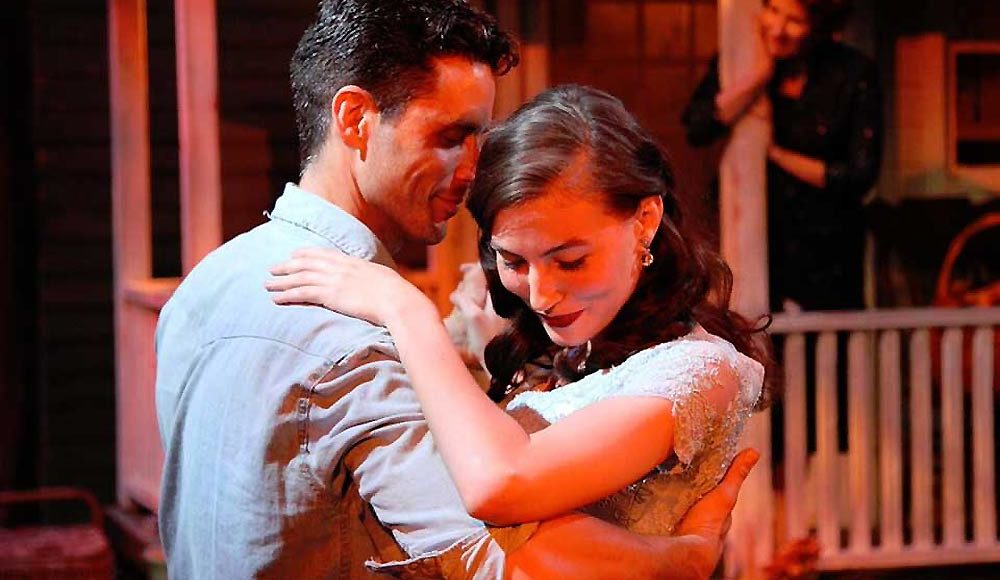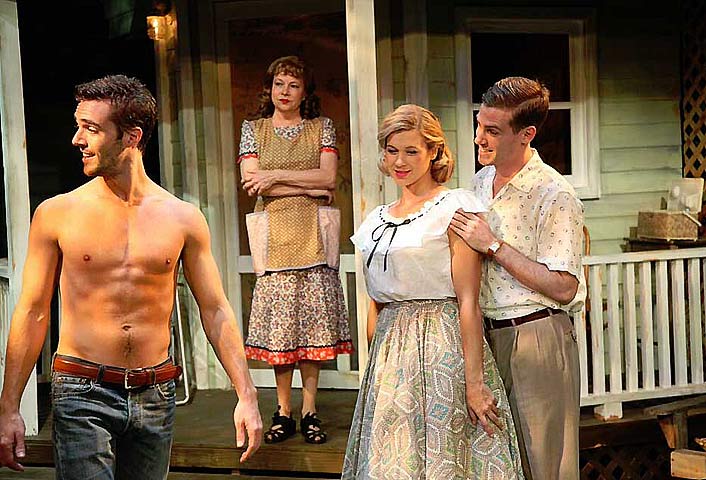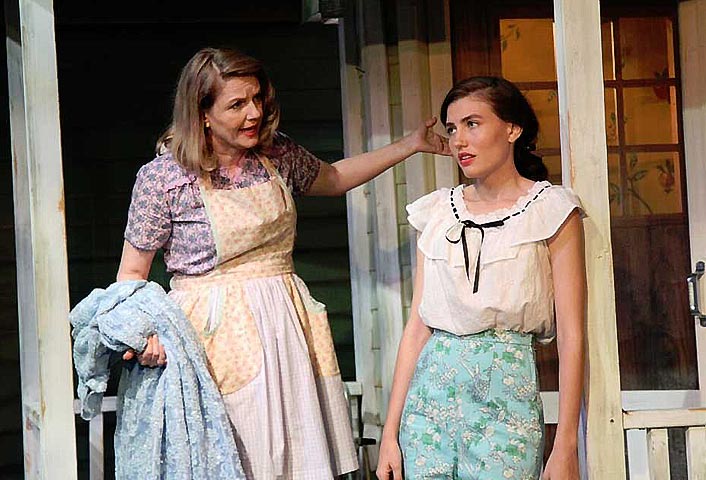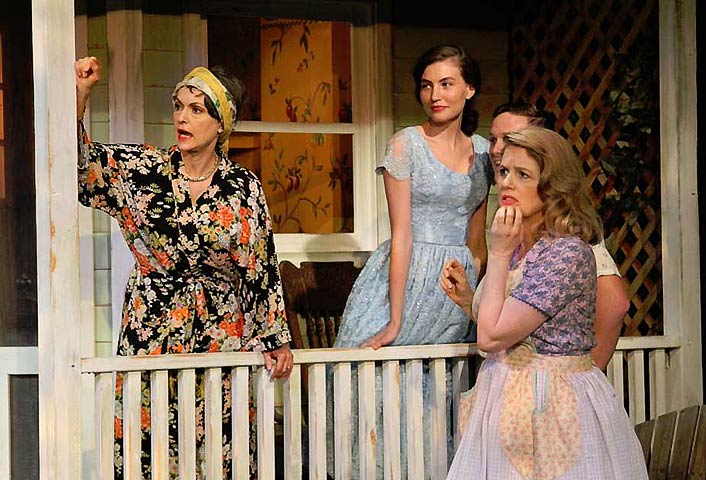The Antaeus Theatre Company always amazes me.
The work they do is of the highest quality, and the actors that make up their company are all top tier.
It is a joy to attend any production they mount, and Picnic, William Inge’s Pulitzer Prize winning drama is no exception.
Now I’ll admit I am not a great fan of Inge, or of Picnic.
Not a bad play by any stretch of the imagination. However, for my taste, this character study drawn from Inge’s Kansas childhood and the boarding house his mother maintained, while splendidly detailed, always plays out too muffled for me. Fan or not, I can nevertheless appreciate the intricate laying of the play, especially when performed by actors whose talents loom large.
Opening on Broadway in 1953, the original cast featured Eileen Heckart, Arthur O’Connell and Kim Stanley. It was also the Broadway debut of an unknown actor – Paul Newman.
Newman had hoped for the role of Hal, the tough, young lead of the play. But Newman wasn’t physically believable to director Joshua Logan for the role of a college football star, so Ralph Meeker got the role of Hal while Newman played Alan, his former college roommate.
The play takes place in the year 1952, but the characters and the time seem of an earlier period. The action is confined within the connecting dooryard between two Midwestern homes. One house is that of Flo Owens (Eve Gordon) and her two young daughters, Madge (Jordan Monaghan) and Millie (Connor Kelly-Eiding), and their boarder, Rosemary (Gigi Bermingham), a teacher at the local school.
The other residence is shared by Helen Potts (Kitty Swink) and her never seen invalided mother, whose needs she is at the beck and call of.
Inge was fond of the old Shakespearean device of mirroring aspects within his play. In Bus Bench there are the old lovers and the young ones, characters who were going nowhere that got on the bus, while characters suddenly free to move, got off.
So it’s likely Inge deliberately sets before us a daughter (Helen Potts) whose life has withered under the inescapable demands of her mother as a portent for Madge, Millie, and perhaps even Rosemary.
With the addition of Rosemary’s fellow teachers, Irma (Tamara Krinsky) and Christine (Maureen Lee Lenker), the drama is centered in a core of women, bracketed on the periphery by men past their prime like Howard (John DeMita)Rosemary’s haberdasher boyfriend or youths like the bratty Bomber (Ben Horwitz) or Madge’s boyfriend Alan (Ross Philips) who is, as the Germans would say, “So good, he’s good for nothing.”
These are men incapable of rippling the imperturbableness of this backyard realm of heartland Amazons or their lives. These are men who are safe.
But the potential of chaos intrudes on their lethargic impoverished existence with the arrival of the swaggering, broad shouldered Hal (Daniel Bess) who enthralls all the women with his big talk and tall tales, and whose libido proves a lightening rod for matrons and maidens alike. As with Eden’s serpent it isn’t carnality or decadence that tempts Inge’s Eve, but the sudden, dizzying discovery that one has before them a vast vista of pathways, ventures and thresholds, which may be purchased for the price of a single “choice.”
Though, satisfaction not guaranteed.
The cast has a medley of familiar talents. Bermingham captivated ITC’s audiences with End of the Rainbow and Master Class. Eve Gordon was amazing in the Ugly One and Anteaus’ superb Peace in Our Time. John DeMita is an actor who has impressed us in the past, and apparently will continue to do so.
Bess and Managham cannot be faulted as the young lovers, and Kelly-Eiding, while perhaps a tad too mature for the role of the awkward younger sister is nevertheless successful in her performance. This role, of Millie, is an interesting one, as the ugly duckling sister, who suffers for the handsome boys she can never obtain and dreams of running off to New York to become a writer, is the character Inge based on himself.
And there is another choice Inge places on stage.
Of course “choice” is at the soul of theatre:
Will Hamlet follow his father’s ghost, will Macbeth listen to the three weird sisters, and will Felix move in with Oscar?
Choice is also part of the dramatic equation: CHOICE → ACTION → CONFLICT.
Yet in Picnic it seems as if Inge has placed the component of “choice” at the forefront of his effort.
A good part of the action is off stage, and a large portion of the conflict generated in the piece is not so much the result of two “actions” colliding, as “bad or wrong choices” coming into discord, and triggering more choices, usually as bad or wrong as the first.
In Poetics Aristotle speaks of the protagonist as one who experiences their misfortune not through offense or vice but “through a certain hamartia ,” commonly translated as “flaw.” However hamartia can also be rendered as “error of judgment” or “mistake.” When you think about it an error or mistake is far more tragic. A “flaw” is part of the protagonist, some internal ticking time bomb. When it goes off, well that’s the natural order of time bombs. But to live a life by the rules, to stay within the lines, and look both ways before crossing the street, and then to have your whole life ruined because you looked left instead of right or because of staying within the lines the one time you should have broke from them. To have your whole life wrecked on the reef of a single —. That seems tragic to me.
At the conclusion of the play, we aren’t graced with the destinies awaiting Inge’s characters.
We don’t know if Madge or Hal will end up hating each other, or if Howard or Rosemary, in a moment of desperation, have merely elected to merge their two small pathetic ruts into a larger one.
Inge provides us with no clue as to their fates.
Perhaps because he doesn’t know himself.
I suspect he is being ironical with his audiences from the outset. As if warming them with the very title, that life is anything but a picnic.
At the end of Picnic we are left knowing three things only.
We know that Flo will go on being miserable and unhappy. Her life is not tragic due to whatever “hamartia” has befallen her. Flo’s life is a tragedy because she is unable to walk away from it.
We have no way of knowing what the future holds for Madge or Hal, Howard or Rosemary, we only know, that for a moment, at the beginning, it held promise.
Lastly, we know, thanks to Cameron Watson’s flawless direction and Robert Selander’s stunning set, that once again, the Antaeus Theatre Company has given Los Angeles another exquisite staging of an American classic for the whole city to enjoy.
And our best wishes to Gregory Itzin for a speedy recovery and return to the stage so honored by his presence.
♦ ♦ ♦
Williams Inge’s PICNIC
Directed by Cameron Watson
playing now – extended to August 30
ANTAEUS THEATRE COMPANY
5112 Lankershim Blvd.
North Hollywood CA, 91601
(1½ bocks south of Magnolia)
PARKING:
$8 in the lot at 5125 Lankershim Blvd. (west side of the street), just south of Magnolia.
FOR ADDITIONAL INFO AND TICKETS:
• (818) 506-1983 or www.Antaeus.org








